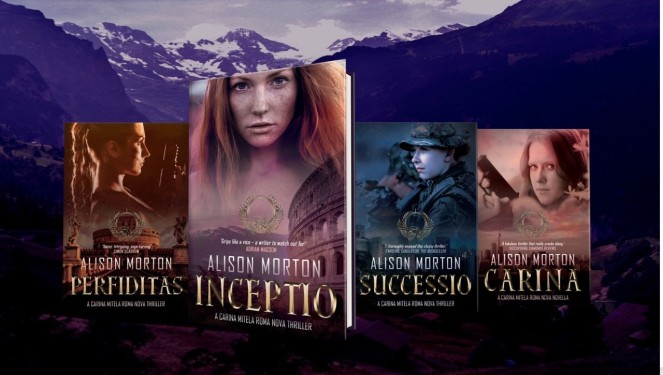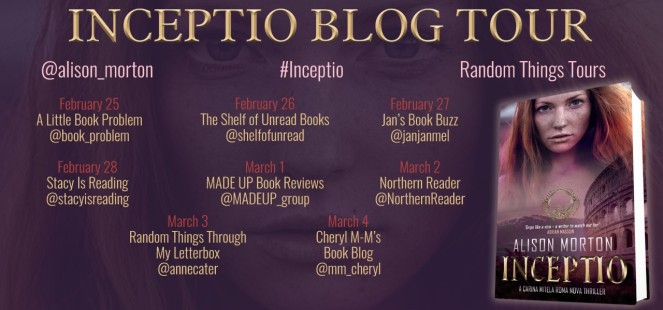 New York – present day, alternate reality. Karen Brown, angry and frightened after surviving a kidnap attempt, has a harsh choice – elimination by government enforcer Jeffrey Renschman or flight to the mysterious Roma Nova, her dead mother’s homeland in Europe.
New York – present day, alternate reality. Karen Brown, angry and frightened after surviving a kidnap attempt, has a harsh choice – elimination by government enforcer Jeffrey Renschman or flight to the mysterious Roma Nova, her dead mother’s homeland in Europe.
Founded sixteen centuries ago by Roman exiles and ruled by women, Roma Nova gives Karen a lover, safety – at a price – and a ready-made family. But Renschman reaches into her new home, intent on destroying her.
To survive, she has no alternative but to toughen up, to learn to fight her fear and her enemy. But crazy with bitterness at his past failures, Renschman sets a heart-wrenching trap for her, knowing she has no choice but to spring it…
Inceptio is the first book in Alison Morton’s Carina Mitela Roma Nova series featuring modern Praetorian heroines. I’m delighted to welcome Alison to The Shelf today to tell us more about the book, and about the unique alternate reality that she has created in the Roma Nova universe.
 Welcome to The Shelf of Unread Books Alison! Inceptio is part of the Roma Nova series. Can you tell us a little about the book and how it fits within the wider Roma Nova universe?
Welcome to The Shelf of Unread Books Alison! Inceptio is part of the Roma Nova series. Can you tell us a little about the book and how it fits within the wider Roma Nova universe?
First of all, thank you for inviting me to your blog, Amy. Inceptio is the beginning of Karen/Carina’s story and the first book in the ‘Carina Mitela’ strand inside the Roma Nova series – Inceptio, Carina, Perfiditas. The other strand – Aurelia, Insurrectio and Retalio – features Aurelia Mitela, Carina’s grandmother, as a younger woman in the late 1960s/early 1980s.
The Roma Nova universe is an incredible alternate history that incorporates elements of the Roman Empire into the 21st century. How did you identify the point of divergence from our known history, and decide how the consequences of that would impact upon your world and the characters within it?
History is full of ‘what ifs’ and the dusk of the Roman Empire is very fertile territory. By the end of the fourth century, the empire was changing internally, retreating and disintegrating. Christianisation was almost complete, but a group of Romans held out and continued to worship the old goddesses and gods.
We hear a lot about Romans persecuting Christians, but by AD 395 Theodosius completed the switch and made practising traditional religion a capital offence. This was a perfect conflict point when the choice was conversion or death. Subsequently, twelve traditional families gathered up their families and goods and escaped north into the mountains to found a new, safer home – Roma Nova.
The world of Roma Nova is incredibly detailed. How on earth did you keep track of all the lore and history required for your world-building?! And how did you ensure that the world felt like a living and breathing one?
The idea has been bubbling away in my head for a long time, decades even, so most of the world was formed by the time I was writing the series. To me, the Roman world is alive; when I walk on the slabs of a forum, I feel the Romans striding, jostling, dawdling on those same slabs. I close my eyes and hear the conversations, the huckstering, the arguing and intimate whispers of people there.
Good world building is crucial and once developed, a writer can concentrate on the characters and the story. It’s crucial with alternative history to study the point of divergence as that’s the last solid basis before jumping off into the void! More practically, I keep a tracking grid of chapters in each book as I go along, plus a spreadsheet of characters’ ages. As well as printed references, I’ve built up a virtual library so I can instantly check if I’m not sure of something. And being a bit of a nerd, if in doubt, I check!
When I’m writing, I tend to think in pictures, so I play out the scenes in my mind first and work out if the characters would do or say a particular thing. Above all, they must act like normal people in their (to them) normal environment.
Inceptio follows Karen Brown as she flees New York to Roma Nova and adopts a new identity to become an undercover investigator. How did you decide on Karen as your protagonist and in what ways did she develop in your mind as the story progressed?
I truly don’t know how Karen came to mind! Carina was more real to me. Karen’s life had to be a contrast to Carina’s, so I had to take her from ordinariness to extraordinariness. Yet her basic character, moral strength and resilience had to be present from her youngest days. I gave her a mixed childhood with loving then indifferent carers, and a determination to make her own way. She built a defensive shell around herself which augmented her natural tendency to challenge. But she still retains the self-doubt of that mixed childhood. When she is in her right place in her life, then those innate characteristics come to the fore.
Roma Nova is a society ruled by women. Was this something that you did intentionally and, if so, what did you hope to explore by creating a matriarchy?
Yes! I had a military father and a feminist mother, which is probably why I served six years in uniform. Since the first encounter with Romans at age eleven, I’d wondered what a Roman world run by women would be like. As I learnt more about Roman life and studied further, it became an increasingly burning question I longed to explore. But in a way, Roma Novan society is ‘egalitarian-lite’ where contribution is by ability not gender and men are not disadvantaged.
The world of Roma Nova is heavily influenced by Roman history. What made you choose this particular period as a backdrop to your books and how did you incorporate Roman history into the 21st century?
I’ve been a ‘Roman nut’ since touching my first mosaic under a hot sun in north-east Spain. Since then I’ve clambered over a lot of Roman Europe. Rome lasted over 1229 years and went from a village in Latium to rulers of the known world. Not wishing to sound like the famous Monty Python film sketch, Rome underlies so much of our current life from arts, law, literature, practical engineering, industry, technology and systems. Despite the polarities in wealth, average citizen prosperity in the first century AD didn’t achieve the same level again until the Victorian age.
Roma Novans continue the core cultural and religious values as well as the robust attitudes and engineering and technology development ability of their ancestors; these helped them survive throughout the centuries. But, pragmatic like their ancestors, they had to evolve and adapt to the realities around them.
Today they are hi-tech innovators, they defend their corner strongly, speak Latin and used solidi as their currency, although with Internet banking and credit cards. Their main street is the Decumanus Maximus, but the traffic jams can be terrible!
The Praetorian Guard is an elite force guarding the imperatrix, or ruler, of Roma Nova but they are pretty much like any other NATO special forces military in their uniforms and weapons. Readers will find much that’s familiar, but with a Roman origin or at least flavour. Binding these together is half the fun of writing Roma Nova
Inceptio manages to combine the action and intrigue of a thriller with the alternate history often found in sci-fi, then laces it with romance and a coming of age tale. Do you feel the book fits within a particular genre or were you keen to use the unique premise to subvert reader expectations in this regard?
Haha! You’ve guessed. While I’m in favour of some subversion and wrote the stories as they came to me, I had to be realistic and market the series with a main category – thriller. However, I can dip into the sci-fi/alternative history, romance and historical fiction areas equally and readers come from each of these. People have often started reviews with ‘This is not my normal reading, but…’
As a reader, I enjoy cross-genre books most. A book without pace or progression, or without an emotional relationship or an intriguing hint of mystery doesn’t satisfy me. Most of all it’s the characters that drive the most interesting stories whatever their time or setting.
Inceptio is the first in a number of adventures for Karen. Could you tell us a little about where her journey takes her next? Will you be writing any more books set in Roma Nova?
Her next adventure, Carina, a novella, takes place a few years later when she goes to North America on what appears to be a straightforward mission. But, of course, it doesn’t turn out like that. Two-and-a-bit years further on, in Perfiditas, she faces betrayal on every level, personal, professional and political. And nine years later, in Successio, (‘the next generation’) she has to face the most serious enemy she’s ever encountered, one who threatens not only her family but Roma Nova itself.
The second strand of adventures feature her grandmother, Aurelia, firstly in Aurelia as a young Praetorian officer in the late 1960s, then later as a foreign minister in the early 1980s. We discover the real story behind the terror of the Great Rebellion in Insurrectio and the endgame of Aurelia’s bitter personal and national rivalry with Caius Tellus in Retalio.
Currently, I’m writing another novella, set between Aurelia and Insurrectio in the 1970s. Now that’s a really interesting research challenge!
Thank you so much, Alison, for answering my questions and sharing the fascinating world of Roma Nova with us!
To find out more about Alison and her books, you can visit her website, sign up to her newsletter, and follow her on Twitter @alison_morton. The series is available in both paperback and ebook from various online retailers and Alison has buying links on her website.
The blog tour for Inceptio continues until 4 March 2019 so please do check out the other stops for reviews, extracts and more! My thanks to Anne Cater from Random Things Tours for inviting me to be part of this tour and arranging the interview with Alison.



This was *such* an interesting set of questions to answer! As you guessed, Rome fascinates me, but so does the development of people (or characters in the book world). What makes them the people they are? And how do they react in stressful circumstances? And can they overcome the problems in front of them, yet grow from the experience?
LikeLiked by 1 person
Thanks so much for the Blog Tour support Amy x
LikeLiked by 2 people